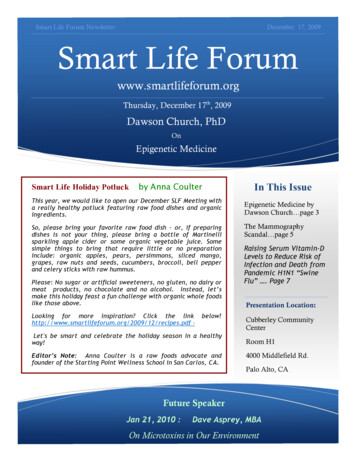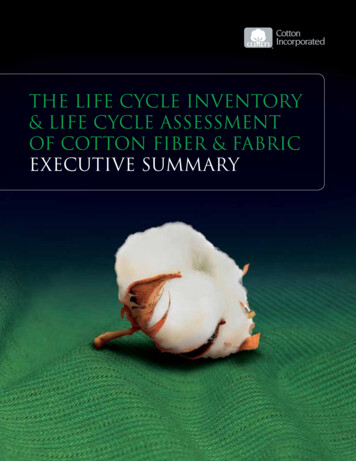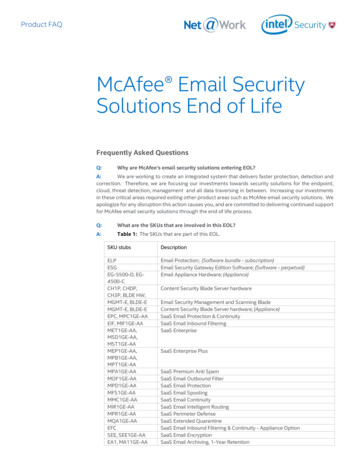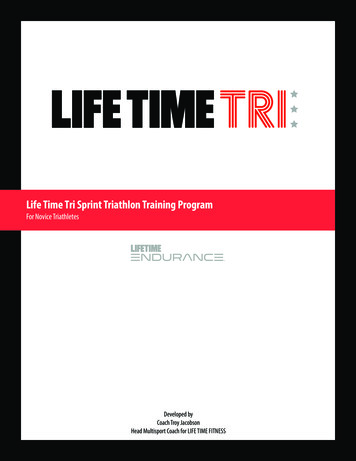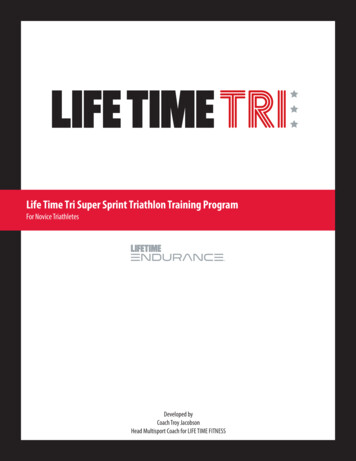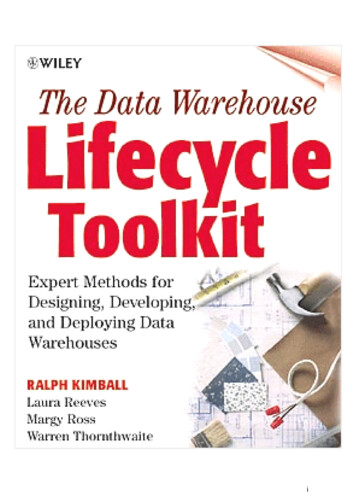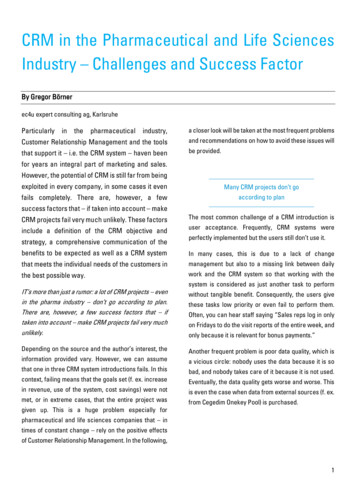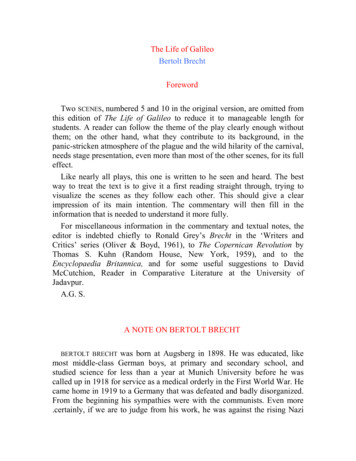
Transcription
The Life of GalileoBertolt BrechtForewordTwo SCENES, numbered 5 and 10 in the original version, are omitted fromthis edition of The Life of Galileo to reduce it to manageable length forstudents. A reader can follow the theme of the play clearly enough withoutthem; on the other hand, what they contribute to its background, in thepanic-stricken atmosphere of the plague and the wild hilarity of the carnival,needs stage presentation, even more than most of the other scenes, for its fulleffect.Like nearly all plays, this one is written to he seen and heard. The bestway to treat the text is to give it a first reading straight through, trying tovisualize the scenes as they follow each other. This should give a clearimpression of its main intention. The commentary will then fill in theinformation that is needed to understand it more fully.For miscellaneous information in the commentary and textual notes, theeditor is indebted chiefly to Ronald Grey’s Brecht in the ‘Writers andCritics’ series (Oliver & Boyd, 1961), to The Copernican Revolution byThomas S. Kuhn (Random House, New York, 1959), and to theEncyclopaedia Britannica, and for some useful suggestions to DavidMcCutchion, Reader in Comparative Literature at the University ofJadavpur.A.G. S.A NOTE ON BERTOLT BRECHTwas born at Augsberg in 1898. He was educated, likemost middle-class German boys, at primary and secondary school, andstudied science for less than a year at Munich University before he wascalled up in 1918 for service as a medical orderly in the First World War. Hecame home in 1919 to a Germany that was defeated and badly disorganized.From the beginning his sympathies were with the communists. Even more.certainly, if we are to judge from his work, he was against the rising NaziBERTOLT BRECHT
movement; but he was a creative artist more than a politician-LikeShakespeare, Brecht was a man of the theatre from the beginning of hiscareer. In 1920 he was a kind of dramatic adviser to a leading Munichtheatre, and worked with some of the greatest and’ most original producersof the century. He produced several plays of his own, which always met withangry criticism because of their political pessimism, but The Three pennyOpera, in 1928, was an outstanding success. This play is an up-to-dateversion of The Beggars’ Opera, a famous eighteenth-century Englishmusical play by John Gay. Gay had used the highwaymen and shadycharacters of the London underworld to satirize leading politicians: Brechtturns the play into a skit on capitalist society. It is both grim and gay. Withcatchy tunes and quotable phrases Brecht celebrates the attitude of theunheroic ordinary man—half exasperated, half amused, and altogetherdisillusioned—when times have been too hard and political morality too lowfor too many years.His next plays were more pointedly communist in flavour. The Mother(1932) is based on a novel of Maxim Gorky’s about a working-class womanin the Russian revolution. It was too effective for the Nazis, who came topower early in the following year. All Brecht’s work was banned inGermany, and he himself and his family had to get out of the country.In 1933 he settled in Denmark, but in 1939, when the Second World Warwas beginning, he got a visa for the United States, and went there, travellingeastward so as to take a look at the U.S.S.R. on the way. He lived in theU.S.A. till the war was over and Europe was beginning to recover; then, in1949, he settled down in East Germany, and stayed there, except foroccasional visits abroad, for the rest of his life. In Berlin he built up adramatic company, the Berliner Ensemble, to try out his own ideas ofdramatic production, and in 1954 the authorities gave him the use of atheatre to experiment in. In 1956, just when his company had arranged avisit to London, he died in Berlin of coronary thrombosis.Brecht wrote in German, and not all his work has yet been translated intoEnglish. He published a few books of poetry and one or two novels, but it isthe plays that have made him internationally famous. Of these, perhaps themost celebrated are The Life of Galileo (written in 1937-9 and revised in1945-7), The Good Woman of Setzuan (1938-40), Mother Courage (1939)—a different play from The Mother— and The Caucasian Chalk Circle (1945).All of them in one way or another treat the theme of revolutionary struggle,but they are too full of human experience and sympathy to be doctrinairetracts. They are not in the least like the conventional modern notion of a
play, for Brecht was full of new ideas about the writing and production ofplays for our revolutionary age. Some of these ideas are touched on in thecommentary at the end of this book (and an alert reader with someexperience of the stage may discover a few more in the play itself); but theyare too far-reaching to be discussed at all adequately in a book of this size.‘Great’ is a strong word, not to be used lightly of a contemporary writer.Even so, many critics, by no means all of them communists, think thatBrecht if anyone will take his place as the great dramatist of our century.CHARACTERS in order of appearanceGalileo GalileiAndrea Sarti, Galileo’s pupilSignora Sarti, Galileo’s house-keeper and Andrea’s motherLudovico Marsili, a rich young manSignor Priuli, Curator of the University of PaduaSagredo, Galileo’s friendFederzoni, a lens-grinderVirginia, Galileo’s daughter The Doge of VeniceCosimo de’ Medici, Grand Duke of Florence de’ Medici’s chamberlainA theologian, a philosopher, a mathematicianA fat prelate, a very thin monk, a very old cardinalFather Christopher Clavius, astronomer-in-chief, at the Papal CollegeA little monkThe Cardinal InquisitorCardinal Barberini, later Pope Urban VIIICardinal Bellarmin Filippo Mucius, a scholarSigner Gaffone, Rector of the University of PisaVanni, an iron-founderA monk, a peasant, a frontier-guardAlso senators, professors, court ladies, scholars, monks, astronomers,clerks, officials, pupils, men, women and children
THE LIFE OF GALILEO1GALILEO GALILEI, TEACHER OF MATHEMATICS AT PADUA,DETERMINES TO PROVE THE NEW COPERNICAN SYSTEMIn the year sixteen hundred and nineScience’s light began to shine.At Padua City, in a modest houseGalileo Galilei set out to proveThe sun is still, the earth is on the move.Galileo’s humble Study in PaduaIt is morning. A boy, Andrea, the son of the housekeeper, brings in a glassof milk and a roll of bread.GALILEO washing the upper part of his body, puffing, and good humoured:Put the milk on the table. But don’t shut any of my books.ANDREA: Mother says we must pay the milkman. If we don’t, he’ll soonbe making a circle round our house, Signor Galilei.GALILEO: The expression is: he will be describing a circle, Andrea.ANDREA: All right. If we don’t pay, he’ll be describing a circle round us,Signor Galilei.GALILEO : While the bailiff, Signor Cambione, will come straight here bytaking what sort of a line between two points?ANDREA grinning: The shortest.GALILEO: Good, I’ve got something for you. Look behind the star-charts.Andrea fishes out from behind the star-charts a large wooden model ofthe Ptolemaic system.ANDREA: What is it?GALILEO: That shows how; according to the ancients, the stars move roundthe earth.ANDREA: HOW?GALILEO: Let’s examine it. Begin at the beginning: description.ANDREA : In the middle is a little stone.GALILEO: That is the earth.
ANDREA:Then all around, one outside the other, there are globes.GALILEO: How many?ANDREA : Eight.GALILEO: Those are the crystal spheres.ANDREA: And the globes have little balls fixed on .GALILEO: The stars.ANDREA: There are strips with words painted on them.GALILEO: What words?ANDREA: The names of stars.GALILEO: Such as?ANDREA: The lowest ball is the moon, it’s written on it. And above it isthe sun.GALILEO: And now make the sun move.ANDREA moves the globes: That’s beautiful. But we’re so shut in.GALILEO drying himself: Yes, I felt that too when I saw the thing for thefirst time. Some people do feel it. He throws the towel to Andrea, for him todry his back. Walls and globes and immobility! For two thousand years menhave believed that the sun and all the stars of heaven revolve about them.The pope, the cardinals, the princes, the scholars, captains, merchants,fishwives and schoolboys believed themselves to be sitting motionless in thecentre of this crystal globe. But now we are travelling headlong into space,Andrea. For the old age is past, and this is a new age. During the lasthundred years it has been as though men were expecting something. Thecities are narrow and so are men’s minds. Superstition and plague. But nowwe say: because it is so, it will riot remain so. For everything moves, myboy.I like to think that it began with ships. Ever since men could rememberthey crept only along the coasts; then suddenly they left the coasts and spedstraight out across the seas.On our old continent a rumour started: there are new continents! Andsince our ships have been sailing to them the word has gone round all thelaughing continents that the vast, dreaded ocean is just a little pond. And agreat desire has arisen to fathom the causes of all things: why a stone fallswhen you drop it, and how it rises when you throw it in the air. Every daysomething new is discovered. Even centenarians let the youngsters shout thelatest novelty into their ears.
Already much has been discovered, but there is more still to be found out.And so there are always new things for new generations to do.When a young man in Siena, I saw how a couple of builders, after fiveminutes argument, replaced a thousand-year-old system for moving graniteblocks by a new and more practical arrangement of the tackle. Then andthere I knew-the old age is past and a new age is here. Soon mankind willknow the truth about their home, about the heavenly body on which theydwell. What is written in the old books no longer satisfies them.For where belief has prevailed for a thousand years, doubt now prevails.All the world says: yes, that’s written in books but now let us see forourselves. The most solemn truths are being tapped on the shoulder; whatwas never doubted is now in doubt.And because of that a great wind has arisen, lifting even the goldembroidered coat-tails of princes and prelates, so that the fat legs and thinlegs underneath are seen; legs like our legs. The heavens, it has turned out,are empty. And there is a gale of laughter over that.But the waters of the earth are driving our new spindles and in thedockyard, in the rope and sail shops, five hundred hands are moving togetherin a new way of working.I predict that in our lifetimes astronomy will be talked about in themarket-places. Even the sons of fishwives will go to school. For these citypeople seeking after novelty will be glad that the new astronomy now letsthe earth move freely, too. It has always been said that the stars arc affixedto a crystal sphere to prevent them falling down. But now we have pluckedup courage and we let them soar through space, unfettered and in full career,like our ships, unfettered and in full career.And the earth rolls happily round the sun, and the fishwives, merchants,princes and cardinals and even the Pope roll with it.Overnight the universe has lost its centre, and by morning it has countlessones. So that now each - and none-is regarded as its centre. For suddenlythere is plenty of room.Our ships sail far across the seas, our stars travel far through space ; evenin chess the castles have lately taken to moving all over the board.What does the poet say? ‘Oh happy morning of beginning . . .’ANDREA: ‘Oh happy morning of Beginning!Oh scent of winds from new and distant shores!’ And you must drink yourmilk; for people will start coming again soon.
GALILEO: Doyou understand what I told you yesterday?ANDREA: What? All that about Kippernicus and his rotation?GALILEO: Yes.ANDREA: No. How do you expect me to understand it? It’s very difficult,and I’m only eleven next October.GALILEO: I particularly want you to understand it too. That’s why I’mworking and buying expensive books instead of paying the milkman - so thatpeople like you can understand itANDREA: But I can see that the sun is in a different place in theevening from what it was in the morning. So it can’t be standing still. Never,never.GALILEO: You see! What do you see? You see nothing. You only goggle.Goggling is not seeing. He sets the iron wash-basin in the middle of theroom. Well, that’s the sun. Sit down. Andrea sits on the one chair. Galileostands behind him. Where is the sun, right or left?ANDREA: Left.GALILEO: And how can it get to your right?ANDREA : If you carry it to the right, of course.GALILEO: Is that the only way? He picks him up with the chair and rotateshim through a semicircle. Now where is the sun?ANDREA : On the right.GALILEO: And did it move?ANDREA : No! It didn’t.GALILEO: Well, what did move?ANDREA: I did.GALILEO shouts: Wrong, you idiot! The chair.ANDREA: But I went with it!GALILEO: Of course you did. The chair is the earth. You are sitting on it.SIGNORA SARTI has entered to make the bed. She has been looking on:Whatever are you doing with my boy, Signor Galilei?GALILEO: I’m teaching him to see, Sarti.SIGNORA SARTI: By lugging him round the room?ANDREA: Stop it, mother. You don’t understand this.
SIGNORA SARTI :Don’t I? But you understand it, eh? - A young gentlemanwishing tuition. Very well dressed and brings a letter of recommendation.She hands this over. You’ll soon have my Andrea saying twice two isfive. He already muddles up everything you tell him. Yesterday evening heactually was proving to me that the earth goes round the sun. He is firmlyconvinced that a gentleman by the name of Kippernicus has worked that out.ANDREA: Didn’t Kippernicus work it out, Signer Galilei? Tell her yourself.SIGNORA SARTI: What! Are you really teaching him such nonsense? Sothat he’ll chatter about it at school and the reverend gentlemen will comecomplaining to me because he repeats all this unholy stuff. You ought to beashamed of yourself, Signor Galilei.GALILEO breakfasting: As a result of our investigations, Signora Sarti, andafter bitter dispute, Andrea and I have made discoveries which we can nolonger withhold from the world A new era has dawned, a great age in whichit is a joy to be alive.SIGNORA SARTI: Well! I hope we shall also be able to pay the milkman inthis new age, Signor Galilei. Pointing to the letter of recommendation. Justdo me one favour and don’t send him away too. I’m thinking of the milk bill.Exit.GALILEO laughing: At least let me finish my milk! To Andrea: So we didunderstand something yesterday, after all!ANDREA: I only said it to her to astonish her. But it isn’t true. When I wasin the chair, you only turned it round - and not like that. He makes avertically circular movement with his arm. Because if you had done that Ishould have fallen off, and that’s a fact. Why didn’t you turn the chairupside down? Because then it would have proved that I should also fall offthe earth if it turned like that. There you are]GALILEO: But I have proved to you . . .ANDREA: But last night I discovered that if the earth really turned like thatI’d be hanging head downwards at night. And that’s a fact.GALILEO taking an apple from the table: Look, this is the earth.ANDREA: Don’t take examples like that, Signor Galilei. You can proveanything with them.GALILEO putting the apple back: All right.ANDREA: You can do anything with examples if you’re clever enough.Only I can’t lug my mother about in a chair like you did me. So you see
what a bad example that is. And what about it, if the apple is the earth?That’s nothing.GALILEO laughs: You don’t want to know.ANDREA: Pick it up again. Why don’t I hang head downwards at night?GALILEO: Well, here is the earth, and this is you standing on it. He sticks asplinter from a piece of kindling wood into the apple. And now the earthrotates.ANDREA: And now I’m hanging head downwards.GALILEO: How? Look carefully. Where is your head?ANDREA points at the apple: There. Down below.GALILEO: What? He turns the apple back. Isn’t your head in the sameplace? Aren’t your feet still on the ground? Are you like this when I turn it?He takes the splinter out and turns it upside down.ANDREA: No. Then why don’t I feel the earth turning?GALILEO: Because you’re turning with it. You and the air around you andeverything that’s on the globe. ANDREA: And why does it look as if the sun’smoving?GALILEO once more rotates the apple with the splinter in it: Now, belowyou see the earth, that stays the same, it’s always below you and nevermoves so far as you are concerned. But now look above you. Now the lampis over your head. But now, when I’ve turned the earth, what’s over yourhead now-that is, up above?ANDREA rotates himself too: The stove.GALILEO: And where is the lamp?ANDREA: Down below.GALILEO: There you are!ANDREA: That’s fine. That’ll amaze her!Ludovico Marsili, a rich young man, enters.GALILEO: This place is like a cross-roads.LUDOVICO : Good morning, signor. My name is Ludovico Marsili,GALILEO studying his letter of recommendation: You have been inHolland?LUDOVICO: Where I heard much of you. Signer Galilee.GALILEO: Your family owns estates in the Campagna?
LUDOVICO:My mother wants me to have a look round. See what’shappening in the world, and so on.GALILEO: And you heard in Holland that I, for example, was happening inItaly?LUDOVICO: And since my mother wishes me to have a look round in theworld of science too . . .GALILEO : Private tuition, ten scudi a month.LUDOVICO : Very well, signor.GALILEO: What are your interests?LUDOVICO: Horses. GALILEO: Ah,LUDOVICO : I have no head for learning, Signor Galilei.GALILEO : Indeed. In that case it will be fifteen scudi a month.LUDOVICO: Very well, Signor Galilei.GALILEO : I shall have to take you early in the morning. Thai will be yourloss, Andrea. For of course you’ll have to drop out. You understand; youdon’t pay.ANDREA: All right, I’m going. Can I have the apple?GALILEO : Yes.Exit Andrea.LUDOVICO : You will have to have patience with me. Particularly since inscience everything is different from what plain common sense tells one. Youtake for example that funny tube they’re selling in Amsterdam. I examined itclosely. Just a casing of green leather and two lenses, one like that indicatesby gesture a concave lens-and one like that indicates a convex lens. I hearthat one enlarges and the other diminishes. Any sensible person would thinkthat they’d cancel each other out. Wrong. One sees everything five times aslarge through the thing. That’s your science for you.GALILEO: What does one see five times as large?LUDOVICO : Church spires, doves; everything that’s far away.GALILEO: Have you yourself seen church spires enlarged like that?LUDOVICO: Yes, signer. GALILEO: And the tube had two lenses? He makesa sketch on a piece of paper. Did it look like that?Ludovico nods. How old is this discovery?LUDOVICO: I don’t think it was more than a few days old when I left:Holland; in any case it hadn’t been longer on the market.
GALILEOalmost friendly: And why must it be physics? Why not horse-breeding?Enter Signora Sarti, unnoticed by Galileo.LUDOVICO : My mother thinks that a little science is necessary. All theworld takes a drop of science with their wine nowadays, you know.GALILEO: You could just as well choose a dead language or theology.That’s easier.He sees Signora Sarti. All right, come on Tuesday morning.Exit Ludovico.GALILEO: Don’t look at me like that. I’ve accepted him.SIGNORA SARTI : Because you saw me at the right moment. The Curator ofthe University is outside.GALILEO : Bring him in, he’s important. It may mean five hundred scudi.Then I won’t need any pupils.Signora Sarti brings in the Curator. Galileo has finished dressing and isscribbling figures on a scrap of paper.Good morning, lend me half a scudo. He gives the coin, which theCurator digs out of his purse, to Sarti. Sarti, send Andrea down to thespectacles-maker for two lenses; here are the particulars.Exit Sarti with the note.THE CURATOR: I have called respecting your application for an increase insalary to a thousand scudi. Unfortunately, I cannot recommend this to theUniversity. You know that at the present time the mathematical faculty is noattraction at a university. Mathematics is a profitless art, so to speak. Notthat the Republic does not esteem it most highly. It is not as necessary asphilosophy, nor as useful as theology, but it affords its devotees such endlesspleasures.GALILEO over his papers’. My dear man, I cannot manage on five hundredscudi.THE CURATOR : But Signor Galilei I You lecture twice a week, two hoursat a time. Your exceptional reputation must surely bring you as many pupilsas you wish, all of whom can pay for private lessons. Have you no privatepupils?GALILEO: Sir, I have too many! I teach and teach, and when have I time tostudy? God above, I am not as omniscient as the gentlemen of thephilosophic faculty. I am stupid. I understand absolutely nothing. So I am
compelled to patch up the holes in my knowledge. And when am I to dothat? When am I to research? Sir, my science is still hungry for knowledge IFor the answers to our greatest problems; we have so far nothing buthypotheses. And we demand proofs. But how can I progress when, to keepmy household going, I am driven to drum into any blockhead who can paythe fact that parallel lines meet at infinity?THE CURATOR: You should not altogether forget that, while the Republicmay not pay as much as certain Princes do, it guarantees freedom ofresearch. We in Padua admit even Protestants to our lectures! And we grantthem doctorates. Not only did we not surrender Signer Cremonmi to theInquisition when it was proved to us - proved, Signer Galilei -that he givesvent to irreligious utterances, but we even voted him a higher salary. As faraway as Holland it is known that Venice is the republic where the Inquisitionhas no say. And that is worth something to you who are an astronomer thatis, devoting yourself to a science which has for a considerable time ceased toshow a due respect for the teachings of the Church!GALILEO: Your people here handed Signor Giordano Bruno over to theauthorities in Rome. Because he spread the teachings of Copernicus.THE CURATOR: Not because he spread the teachings of Copernicus, whichare moreover false, but because he was not a Venetian and also had noappointment here. So you can leave out of your argument this man who wasburnt at the stake. By the way, for all our freedom you would be welladvised not to utter so loudly a name on which the Church has laid itsanathema. Not even here, Signor Galilei. Not even here.GALILEO: Your protection of freedom of thought is quite a profitablebusiness, eh? By pointing out that elsewhere the Inquisition rules and burns,you get good teachers cheap. In return for protection from the Inquisitionyou reimburse yourselves by paying the worst salaries.THE CURATOR: Unjust! Unjust! What good would it do you to have all thefree time in the world for your researches “if every ignorant monk of theInquisition could simply forbid your thoughts? No rose without a thorn, noprinces without monks, Siguor Galilei.GALILEO: And what use is freedom of research without free time in whichto research? What happens to the results? Perhaps you would care to showthe gentlemen of the Signoria these investigations into the Laws of FallingBodies - he points to a bundle of manuscripts - and ask them whether that isnot worth a few more scudi?THE CURATOR: It is worth infinitely more, Signor Galilei.
GALILEO :Not infinitely more, but five hundred scudi more, sir.THE CURATOR : Scudi are worth what scudi will buy. If you want money,you must produce something else. For the knowledge which you sell, youcan only demand as much as it profits whoever buys it from you. Forexample, the philosophy which Signor Colombe is selling in Florence bringsthe Prince at least ten thousand scudi a year. Your Laws of Falling Bodieshave created a stir, admittedly. Men applaud you in Paris and Prague. Butthe gentlemen who applaud there do not, unfortunately, pay the Universityof Padua what you cost it. Your misfortune is your subject, Signor Galilei.GALILEO: I understand. Free trade, free, research. Free trading in research,eh?THE CURATOR: But, Signor Galilei! What a suggestion I Permit me to saythat I do not understand your jesting remarks. The flourishing trade of theRepublic seems to me to be scarcely a subject for derision. Even less could I,for so many years Curator of the University, bring myself to speak ofresearch in that - may I say - frivolous tone. As Galileo casts longing glancesat his work-table. Consider the conditions in the world outside: the whips ofbondage under which learning groans in certain places whips which theauthorities have cut from their old leather folios. In those places people mustnot know how a stone falls; only what Aristotle writes on the subject. Eyesare just for reading. What need for new laws of falling bodies, where onlythe laws of a footfall are important? Set against that the endless pleasurewith which our Republic accepts your ideas, however daring they may be.Here you can research. Here you can work. No one supervises you, no oneoppresses you. Our merchants, who appreciate the importance of better linenin their struggle against Florentine competition, listen with interest to yourcall for better physics; and how greatly is the science of physics indebted tothe call for better looms! Our most eminent citizens interest themselves inyour researches, visit you, watch, demonstrations of your discoveries, andthey are gentlemen whose time is precious. Do not despise trade, SignorGalilei! No one here would tolerate your work being disturbed in theslightest degree or that intruders should make difficulties for you. Admit,Signor Galilei, that you can work here.GALILEO in desperation: Yes.THE CURATOR: And as far as the material side is concerned, why don’t youinvent something else as pretty as your wonderful proportional compasseswhich - he counts off on his fingers - enable one without any mathematicalknowledge to protract lines, calculate compound interest on capital,
reproduce ground plans in varying scales, and determine the weight ofcannon-balls.GALILEO: A toy!THE CURATOR: Something that has delighted and amazed the highest in theRepublic and also brought in cash, you call a toy. I hear that even GeneralStefano Gritti is able to extract square roots with this instrument.GALILEO: Indeed a miracle I-Nevertheless, Priuli, you have made methoughtful. Priuli, perhaps I have something of the sort you mentioned. Hepicks up the paper with the sketch on it.THE CURATOR: Have you? That would be the solution. He stands up.Signor Galilei, we know that you are a great man. A great but discontentedman, if I may say so.GALILEO : Yes, I am discontented, and that is what you would pay me for,if you had the wit! For I am discontented with myself. But instead of thatyou force me to be discontented with you. I admit that it amuses me to provemy worth to you gentlemen of Venice, in your famous arsenal and yourdockyards and your cannon foundries. But you leave me no time to pursuethe far-reaching speculations on my own subject which crowd into my mindwhen I am there. You muzzle the ox which threshes! I am forty-six years oldand have done nothing which satisfies me.THE CURATOR: Then let me disturb you no longer.GALILEO: Thank you.Exit the Curator. Galileo, alone for a few moments, starts lo work. ThenAndrea comes running in.GALILEO working: Why haven’t you eaten the apple?ANDREA : So that I could show her that it turns.GALILEO: I must say something to you, Andrea. Don’t talk to other peopleabout our ideas.ANDREA: Why not?GALILEO: The authorities have forbidden them.ANDREA : But they’re the truth.GALILEO : But they forbid them. In this case there is something else aswell. We physicists still cannot prove what we believe to be correct. Eventhe teaching of the great Copernicus has not yet been proved. It is only ahypothesis. Give me the lenses.
ANDREA:The half scudo wasn’t enough. I had to leave my coat behind.Pledge.GALILEO: Whatwill you do in winter without a coat?A pause.Galileo arranges the lenses on the sheet of paper bearing the sketch.ANDREA: What is a hypothesis?GALILEO : It is when one accepts something as probable, but has no facts.That Signora Felice down the street by the basket-maker’s shop, who has achild at the breast, gives the baby milk and doesn’t take milk from it, is ahypothesis until one goes and sees, it and can prove it to be a fact. But indealing with the stars we are like worms with clouded eves who can see onlyvery little. The old teachings, which were believed for a thousand years, arecollapsing; there is less wood in those gigantic structures than in the propsthat are supposed to shore them up - the many laws that explain little.Whereas this new hypothesis has few laws that explain much.ANDREA: But you have proved everything to me.GALILEO : Only that it can be so. You understand, the hypothesis is a veryfine one, and there is nothing against it.ANDREA: I should like to be a physicist too, Signer Galilei.GALILEO: I believe it - seeing the infinity, of questions to be cleared up inour field. He has crossed to the window and looked through the lenses.Mildly interested: Take a look through this, Andrea,ANDREA: Holy Mary, everything comes close. The bell on “the campanileis quite near. I can even read the copper letters:Gratia Dei.GALILEO: That will bring us in five hundred scudi.2GALILEO PRESENTS THE REPUBLIC OF VENICEWITH A NEW DISCOVERYNo one’s virtue is complete:
Great Galileo likes to eat.You will not resent, we hope,The truth about his telescope.The Great Arsenal of Venice, by the HarbourSenators, at their head the Doge. To one side, Galileo’s friend Sagredoand fifteen-year-old Virginia Galileo with velvet cushion on which lies atel
The sun is still, the earth is on the move. Galileo’s humble Study in Padua It is morning. A boy, Andrea, the son of the housekeeper, brings in a glass of milk and a roll of bread. GALILEO washing the upper part of his body, puffing, and good humoured: P

